Text
Episode 1-3 / Grammar / V + (으)ㄴ 지(가) 얼마 안 되었다 and V + (으)ㄴ 지(가) 오래되었다
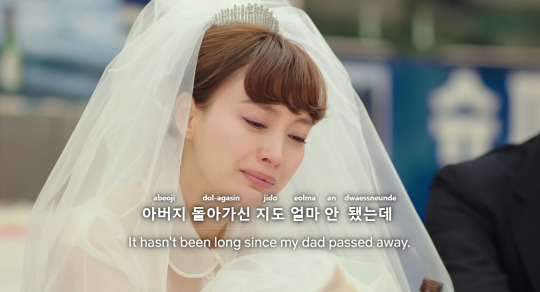
V + (으)ㄴ 지(가) 얼마 안 되었다
V + (으)ㄴ 지(가) 얼마 안 되었다 is a phrase which can be added onto the end of a verb to say that it hasn't been long since something happened. The (가) is optional and doesn't have any impact on the overall meaning of the sentence.
It hasn't been long since I met my girlfriend.
여자 친구 만난 지가 얼마 안 되었어.
It hasn't been long since I arrived in my hometown.
고향 온 지가 얼마 안 되었어요.
It hasn't been long since I moved to Seoul.
서울에 이사한 지 얼마 안 되었어요.
In the example from the scene, Dani says 아버지 돌아가신 지도 얼마 안 됐는데... meaning that it hasn't been long since her father passed away. She's saying this because the stress of both his death and Dani running from the wedding may be too much for her mother, and she's worried about her health.

V + (으)ㄴ 지(가) 오래되었다
V + (으)ㄴ 지(가) 오래되었다 is the opposite of V + (으)ㄴ 지(가) 얼마 안 되었다. It is used to show that it has been a long time since something happened.
It's been a long time since I played basketball.
농구한 지가 오래되었어.
Have you been married for a long time?
결혼한 지가 오래되었습니까?
It's been a long time since I met that person.
그분을 만난 지 오래되었어요.
For both of these forms, 되었다 can also be shortened to 됐다 when using this form.
It hasn't been long since I met my girlfriend.
여자 친구 만난 지가 얼마 안 됐어.
It hasn't been long since I arrived in my hometown.
고향 온 지가 얼마 안 됐어.
It's been a long time since I met that person.
그분을 만난 지 오래됐어요.
#korean#learn korean with k-dramas#korean grammar#kdrama#korean language#korean blog#learn korean#learning korean#studying korean#hangul#romance is a bonus book#intermediate korean grammar#intermediate korean
7 notes
·
View notes
Text
Episode 1-3 / Grammar / N+ (이)며

N+ (이)며
(이)며 is attached to a noun when you are listing more than one example of something. This form gets attached to each of the examples that are used in the sentence to indicate that they are all possible options.
If the noun ends in a consonant, use 이며. If it ends in a vowel, just use 며.
The food, the atmosphere… everything is good at that restaurant.
그 식당은 음식 맛이며 분위기며 다 좋아요.
Yongsu-ssi is good at everything, whether it’s studying or exercising.
영수 씨는 공부며 운동이며 못하는 게 없어요.
There is meat, drinks, and whatever you need in the fridge.
냉장고에 고기며 음려수며 모두 있어요.
Whether it's the students or the teachers, everyone in the classroom is working hard.
교실에 학생이며 선생님이며 모두 열심히 곤부해요.

N+ (이)며 + 까지
When using this grammar, you can replace the final (이)며 with 까지. Doing this doesn't change the meaning of the sentence, it just adds a bit of nuance and variations to what you're saying.
There is meat, drinks, alcohol and whatever you need in the fridge.
냉장고에 고기며 음려수며 술까지 모두 있어요.
In our class, students from America, Japan, and even Europe all study together.
우리 반에 미국학생이며 일본학생이며 유럽학생까지 다양한 나라의 학생들이 함께 공부를 해요.

In this scene, Dani says 신혼여행 스페인 가기로 했는데 엄마가 돈 없다고 제주도 가라 그랬는데 내가 우겨 가지고 신혼집에 넣을 가구며 뭐며 다 빚인데.
This sentence literally translates to ‘because I insisted on honeymooning in Spain, everything that we furnished our newly-wed house with - our furniture and whatever - is debt’.
A more natural way of translating this sentence would be ‘because I insisted on honeymooning in Spain, everything that we furnished our newly-wed house with - our furniture and whatever - was bought on credit,’ since they used all of their money on their honeymoon and had to borrow money to furnish their new home.
#korean blog#learn korean#korean drama#korean#romance is a bonus book#hangul#studying korean#language blog#korean language#learning languages
6 notes
·
View notes
Text
Episode 1-3 / Grammar / A/V-아/어 가지고

A/V-아/어 가지고 - Because
A/V-아/어 가지고 is another Korean grammar rule that’s used to say because. It's similar to 아/어서, but is used mainly in spoken conversation, so you won't really find this form in books.
I can't sleep and so I am tired.
잠을 못 자 가지고 피곤해요.
We had to wait for a long time because we arrived too early.
우리가 너무 일찍 와 가지고 오랫동안 기다렸어요.
I'm so busy these days, so I don't have time to meet my friends.
요즘 너무 바빠 가지고 친구를 만날 시간이 없어요.
In this scene, Dani is using this form to say that because she insisted on going to Spain even though they have no money (엄마가 돈 없다고 제주도 가라 그랬는데 내가 우겨 가지고), she had to take out a loan to be able to afford everything for their newlywed house (신혼집에 넣을 가구며 뭐며 다 빚인데).

A/V-아/어 가지고 - Expressing Order of Events
A/V-아/어 가지고 can also indicate that one action happens after the other, and that the 1st action must be complete in order to do the 2nd action.
When going hiking, I will make gimbap and take it with me.
등산갈 때 김밥을 만들어 가지고 갈게요.
I borrowed a book from my friend and read it.
친구에게 책을 빌려 가지고 읽었어요.
I want to graduate quickly and find a job.
빨리 졸업해 가지고 취직하고 싶어요.

A/V-아/어 갖고
V-아/어 가지고 can also be shortened to V-아/어 갖고.
When going hiking, I will make gimbap and take it with me.
등산갈 때 김밥을 만들어 갖고 갈게요.
We had to wait for a long time because we arrived too early.
우리가 너무 일찍 와 갖고 오랫동안 기다렸어요.
#korean#learn korean with k-dramas#korean grammar#kdrama#korean language#romance is a bonus book#beginner korean#korean beginner#learning korean#hangul
13 notes
·
View notes
Text
Episode 1-3 / Grammar / 기로 하다

기로 하다
This form can be added to the end of a clause to indicate that you’ve decided to do something. Just as with English, it’s most common to see this form used in the past tense (기로 했다), although it can be used with other tenses as well.
I decided to become a teacher.
저는 선생님이 되기로 했어요.
I decided that from now on, I can’t trust that friend.
지금부터 그 친구를 신용하지 않기로 했어요.
I decided to learn Korean.
한국어를 배우기로 했어요.
We decided to go to Spain for our honeymoon, but...
신혼여행 스페인 가기로 했는데...
This form is more decisive than other similar forms such as (으)ㄹ 거예요 (future tense) and (으)ㄹ까 하다 (to be thinking of doing something).
I decided to meet my friend.
제 친구를 만나기로 했어요.
I’m going to meet my friend.
제 친구를 만날 거예요.
I’m thinking of meeting my friend.
제 친구를 만날까 해요.

기로 결정하다 / 기로 약속하다 / 기로 결심하다
Although 기로 is most commonly used with the basic form 하다, it’s possible to change this verb. Examples include 결정하다 (to decide), 약속하다 (to promise), and 결심하다 (to resolve to). Changing the verb doesn’t change the meaning of the sentence, it just adds a stronger sense of determination.
I decided to quit drinking today.
오늘 술을 끊기로 약속했어요.
She decided to sue her employer for wrongful dismissal.
그녀는 자신의 고용주를 부당 해고로 고소하기로 결심했다.
#korean#south korea#Korea#learn korean#kdrama#learn korean with kdramas#K-Drama#learn korean with k-dramas#learning korean with k-dramas#big mouth#romance is a bonus book#lee nayoung#Lee Jong Suk#lee nayeon#studying Korean#korean grammar#common korean grammar#easy korean grammar#topik 1#TOPIK 2
15 notes
·
View notes
Text
Episode 1-3 / Grammar / 든(지)
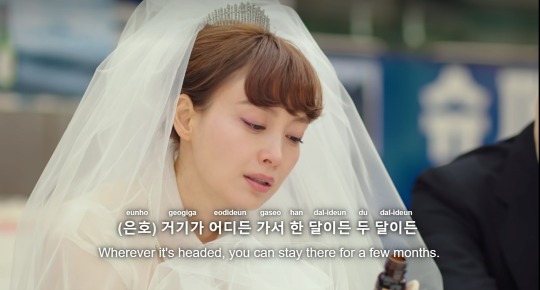
든(지)
As a beginner, you’re taught that (이)나 is the grammar form that you should use when you want to say ‘or’. Although this is the right grammar for the basic meaning of ‘or’, there are some more nuanced usages that require different grammar.
든(지) is used to mean ‘or’ when you have a list of possibilities to choose from. It’s placed after each choice to indicate that these are the options available to choose from, although it’s important to note that in this situation, you aren’t choosing between these options, you’re just indicating that any of the choices mentioned are possible.
It doesn’t matter if you use a fork or use chopsticks, use the one that is more comfortable.
포크를 사용하든지 젓가락을 사용하든지 더 편한 것을 사용하세요.
It doesn’t matter if you win or lose the game, you should try hard.
경기에서 이기든지 지든지 열심히 해야 됩니다.
It doesn’t matter if you agree with the rule or not, you have to follow it.
그 규칙에 동의하든지 안 하든지 그 규칙을 따라야 돼요.
Sometimes the options used aren’t as obvious as ‘A든지 B든지…’. In these cases, the choice given is often just one choice which includes a range of options within it. Often, words like 얼마나 (how much) and 어떤(which) are used to indicate that there is a range of options.
You can buy it anywhere.
어디서든지 사실 수 있어요.
I’ll do anything.
진짜 뭐든지 다 해요.
No matter how angry you were, you should not have argued with him.
네가 얼마나 화가 났었 든지 간에 그때 그와 논쟁을 하지 말았어야 했다.

든(지) 간에
‘간에’ is often added after all of the choices have been listed to add the meaning ‘between these choices’. It adds a nuance that you don’t care about which choice is used, and because of this, it often has a negative feeling attached to it. It’s similar to saying ‘I don’t care which choice you make, just choose’.
It doesn’t matter if we go tomorrow or the day after tomorrow, we have to go at some point.
우리가 내일 가든지 내일모레 가든지 간에 어차피 가야 돼요.
Whether someone made you do it or you did it on your own, what you did was still wrong.
자의든 타의든 간에 당신이 한 일은 잘못된 것이다.

말든(지)
Oftentimes, you may have a simpler choice to make, between doing an action or not doing it. If you want to say this, you can simply use 말든지 as the second option.
It doesn’t matter if there is an exam or not, you have to go to school.
시험이 있든지 말든지 간에 학교에 가야 돼요.
I don’t care if we go or not.
우리가 가든지 말든지 나는 신경을 안 써.
Believe it or not, cats and dogs can be friends.
믿든지 말든지 간에, 개와 고양이는 친구가 될 수 있어요.
Now that we understand all the different usages of 든(지), we can start to understand Eun-ho’s statement in this scene. Eun-ho says 어디든 가서 한 달이든 두 달이든. Although this is a short sentence, we have 2 cases of 든(지). The first is 어디든, which simply means anywhere. The choice indicated here is that it’s possible for Dani to go to any place. The second instance of 든(지) is 한 달이든 두 달이든, which means that Dani could go for one month or she could go for two months. When we put these together, we can translate the sentence as ‘you could go wherever you want for a month or two’.
#kdrama#learn korean with kdramas#learn korean with k-dramas#K-Drama#romance is a bonus book#lee nayoung#Lee Jong Suk#lee nayeon#big mouth#big mouth kdrama#korean#south korea#learn korean#korean grammar#intermediate korean grammar#learning korean#studying Korean#language learning#든지#든#말든지#한국어
9 notes
·
View notes
Text
Episode 1-3 / Grammar / 아/어도, 되다, and 아/어도 되다
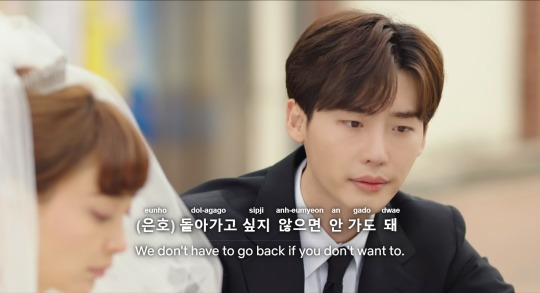
아/어도
When 아/어도 is attached to a supposition, it creates the meaning that regardless of whether the supposition occurs or not, the following action will take place anyway. The closest translation in English would be ‘regardless of whether X is true, Y will happen anyway,’ although depending on the context of the sentence, there may be several more natural translations.
Even if there’s food, I’m not going to eat it.
밥이 있어도 저는 안 먹을 거예요.
I don’t care where you’re going, I don’t want to come.
네가 어디 가도 나는 가고 싶지 않아.
Even if you take a taxi, it takes a long time to get there.
택시를 타도 시간이 오래 걸려요.

되다
Although there are several ways to use 되다, such as in it’s basic verb form and as a passive verb form, we’re going to be focusing on using 되다 to indicate that there is no problem with something. You may see this often as 잘 되다, although both forms are acceptable.
Is the rice okay (to eat) / Is the rice finished?
밥이 됐어요?
Is your business okay / Is your business going well?
사업이 잘 되고 있어요?
Is this paragraph okay/understandable?
이 단락 이해 돼요?

아/어도 되다
This form is a combination of the two forms mentioned above. 아/어도 되다 is used to say that regardless of whether the supposition at the start of the sentence occurs, there’s no problem. It allows room for the action to not happen if the listener changes their mind or decides that the supposition shouldn’t take place, but also reassures them that if it does, everything will be okay.
It’s okay if you want to stay until the morning.
당신이 원하면 아침까지 있어도 돼요.
It’s okay to speak freely.
자유로이 말씀하셔도 돼요.
You can even wear it at formal gatherings.
식적인 모임에서 입으셔도 돼요.
This form can also be used to ask permission for things.
Can I go to the party?
제가 그 파티에 가도 돼요?
Can I stay up late tonight?
오늘밤에는 늦게 자도 돼요?
Is it okay if I open a window?
창문 좀 열어도 돼요?
In this scene, when Eun-Ho says 돌아가고 싶지 않으면 안 가도 돼, he is telling Da-Ni that if she doesn’t want to go back to her wedding, she doesn’t have to. The supposition here is ‘안 가다’ (to not go), so he is saying that if she doesn’t go, it will be okay.
#kdrama#korean#south korea#learn korean#learn korean with k-dramas#learn korean with kdramas#romance is a bonus book#lee jong suk#lee nayeon#lee nayoung#korean grammar#TOPIK 2#intermediate korean grammar#learning korean#big mouth#korean drama
18 notes
·
View notes
Text
Episode 1-3 / Vocab
불안하다 to be anxious/uncomfortable
데 place/location
데려다 주다 to accompany someone
맞추다 to match
어디든 wherever
아무데나 anywhere
신혼여행 honeymoon
라고 그랬다 same as 라고 했다 (quoting form)
우기다 to insist
신혼집 newlywed house
돌아가시다 to pass away (formal)
멈추다 to stop/stay still
#korean#korean vocabulary#korean vocab#korean vocab list#korean blog#kdrama#learn korean with kdramas#learn korean with k-dramas#south korea#romance is a bonus book#lee nayoung#Lee Jong Suk#lee nayeon#beginner korean#korean studyblr#polyglot
10 notes
·
View notes
Text
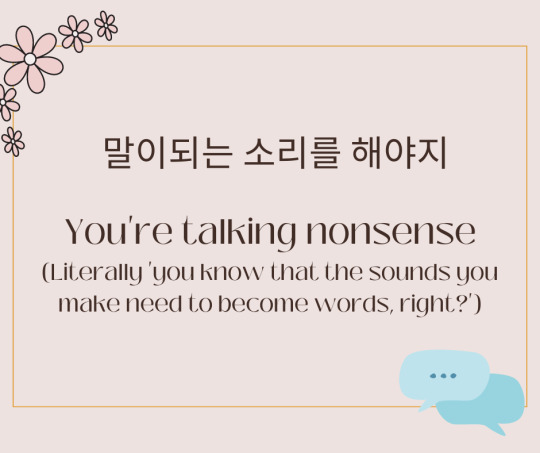
We’re introduced to another really useful saying again in this episode - this time it’s 말이되는 소리를 해야지. Let’s take a look at each part of the phrase so that we can understand it better.
In the main clause, we have 소리를 해, meaning to make a sound. The second clause is 말이 되다, meaning to become speech or words. In this sentence, the present tense noun modifier 는 is used (which you can find out more about in this post). This modifier causes the second clause 말이 되다 to happen to the noun in the main clause. We get the overall noun 말이 되는 소리, or sounds that become words. Of course, 를 해 is the basic verb form, the translation of this phrase is you’re making sounds that become words. The final part of the sentence is 해야지, which uses the imperative form 야 and the affirmation form 지(요) to create the meaning ‘you know you have to’. Once we add this last part, our final translation becomes you know that the sounds you make need to become words, right?
In English, this obviously doesn’t make sense, but we can get the idea of what’s being said. In fact, the final translation is very similar to the English phrase ‘you’re talking nonsense,’ as both phrases suggest that the words or sounds being spoken have no real meaning.
#korean#south korea#kdrama#learning korean#language learning#polyglot#learn korean with k-dramas#learn korean with kdramas#romance is a bonus book#Lee Jong Suk#lee nayeon#lee nayoung#korean sayings#korean colloquialisms#korean grammar#studying Korean
14 notes
·
View notes
Text
Episode 1-2 / Grammar / Imperative Form and Imperative Quoting Form

Today, we’ll be focusing on the imperative quoting form ‘(이)라고 해’. This form is a variation of the quoting form that we covered back when we were studying 식샤를 합시다. This variation uses the same idea, where the the clause that precedes (이)라고 하다 is a quotation, however the usage of 아/어(요) here is different. This version of 아/어(요) is the imperative form.

아/어(요) Imperative Form
There are two indicators that the imperative form is being used - context and omission of the subject. Firstly, an imperative is usually directed at someone, making it contextually obvious that the sentence or phrase is a command. In addition to this, the subject typically isn’t used when giving a command. This is because the person being spoken to is the subject, so adding an indicator is unnecessary. Here are some examples of this difference:
My sister studies hard.
언니가 열심히 공부해요.
Study hard!
열심히 공부해요!
I exercise every Monday.
저는 월요일마다 운동해요.
Exercise every Monday.
월요일마다 운동해요.

Imperative Form Variations
Some other forms are often used with the imperative form, including 시다 (the formal form), 보다 (to try), and 주다 (to give or to do for). Combining these different forms together can give very different meanings and also add variation to your speech, so it’s really useful to be able to use these different forms together. For example:
Go straight ahead on his road (polite).
이 길에서 직진하세요.
Please go straight ahead on this road for me (more polite).
이 길에서 직진해주세요.
Try going straight ahead here (suggests the speaker is lost).
이 길에서 직진해봐요.

(이)라고 해(요) Imperative Quoting Form
When we combine the quotation form (이)라고 하다 and the imperative form, we get a quotation that someone is being asked/told to say. Whilst this form isn’t used nearly as often as its separate components, it’s still useful to be able to identify when someone is quoting someone and when they’re asking you to quote something. Otherwise, as a non-native speaker, things can get very confusing. Here are some examples of this imperative/quotation combined form:
My Dad told me to tell my sisters that my Mom is coming home.
아버지께서 '어머니가 집에 오고 계시다'고 동생들한테 말하라고 하셨어요.
Don’t say mom, say dad!
엄마 말고 아빠라고 해줘!
Tell them it’s not true!
언니라고 해!
This is the form that Eun-ho is using in this scene. He says 아니라고 해, 얼른. It would be easy to misunderstand this and think that Eun-ho is simply using the quotation form here which would make this sentence grammatically incorrect and very confusing (something like ‘Hurry up, I said it’s not true!’). However, since we know this is the imperative version of 해, we can understand that this means no/it’s not true (아니) say (라고 해), quickly (얼른), or when we naturalise it, ‘Hurry up and tell him it’s not true!’. A lot less confusing, right?
#learn korean#south korea#korean#korean blog#korean grammar#intermediate korean grammar#common korean grammar#hangul#learn korean with k-dramas#learn korean with kdramas#lee jong suk#lee nayeon#lee nayoung#romance is a bonus book#kdrama#netflix#language learning#polyglot
5 notes
·
View notes
Text

Not my usual content, but I’m from the UK and I feel like I should be speaking up on what’s going on right now. Idk how much of the news is getting out to the rest of the world other than general outrage but here’s a breakdown of what’s been going on in my country.
Updated 08/10/2022. If anything is missing please send me an ask and I’ll add it after fact-checking. I’ll try to update when I can. Trigger warnings have also been updated.
Please don’t forget about us now that the royal shitshow is done, our country is still in turmoil!!
TW: racism, sexual assault, child abuse, rape, terminal illness, incest, murder, paedophilia, sexism, police brutality, islamophobia.
In the span of 48 hours, the UK was given a new unelected prime minister and king.
Media programming is suspended for a 12 day mourning period, meaning that for 2 weeks, the UK will receive no news of the new PM’s actions.
Kwasi Kwarteng is appointed as Chancellor of the Exchequer, leading the UK’s financial and economic matters.
New PM Liz Truss fires Tom Scholar, the Permanent Secretary to the Treasury. This role is the second most influential in the civil service and gives impartial advice on finance. There is no replacement and the PM may hire someone who will support her decisions.
UK government petitions website suspended ‘until further notice’ out of respect for Queen.
Trade unions postponed their annual congress and cancelled significant strikes as “a mark of respect”.
Chris Kaba is shot and killed by police in South London. He was an unarmed black man driving in a car linked to an alleged firearms incident, however he was not the car’s owner. The officer involved has been suspended.
King Charles inherits the crown estate, which has an estimated value of £15.2billion in assets. He avoids the 40% inheritance tax due to a 1993 “sovereign to sovereign” clause.
Prince Andrew is filmed “comforting” his daughter, prompting allegations that he is groping her.
Man arrested for shouting “who elected him?” at a proclamation event in Oxford.
Protesters arrested for holding a signs reading “abolish the monarchy” and “not my king” over claims of “breaching the peace”.
Man arrested for shouting “Andrew, you’re a sick old man” at Prince Andrew during the procession up the Royal Mile.
Man arrested for carrying eggs near the Queen’s funeral procession due to claims that they could be “potential projectiles”.
Man with a blank sheet of paper threatened with arrest if he wrote ‘not my King’ on it.
Over 100 members of staff at King Charles’ previous residence face threats of redundancy as he moves to Buckingham Palace.
The UK launches an energy price freeze which only benefits the rich as energy bills rise 80% to an average of £3,549 ($4,188) a year from October.
The UK chancellor, Kwasi Kwarteng, plans to scrap caps on bankers’ bonuses. High Pay Thinktank states that “the bonus cap has probably helped to contain bankers’ pay awards but they’ve still reached record highs this year while the rest of the country has undergone an epic cost of living crisis and profound economic hardship”.
Sky News incorrectly reports protests over the killing of Chris Kaba as people coming to pay their respects to the Queen.
A serving MET officer has been charged with 13 counts of crimes against children, including sexual activity with girls as young as 13.
King Charles (previously Prince of Wales) visits Wales on Owain Glyndŵr day. This prompts outrage as national celebrations for Owain Glyndŵr, the last native Prince of Wales, are cancelled.
King Charles heckled in Cardiff: “While we struggle to heat our homes, we have to pay for your parade”.
Prince Harry and Prince Andrew are granted temporary permission to wear military uniform. As they aren’t working royals, they are both usually banned from this - Harry because he stepped down, and Andrew because of his involvement in the Epstein Scandal.
Prince Andrew becomes a Counsellor of State – so he can take over from King Charles if he’s ill or out of the country.
British authorities protected Prince Andrew from US prosecutors investigating his relationship with the financier and sex offender Jeffrey Epstein, according to a new book by a US attorney who led the investigation in New York.
People waited more than 24 hours in a 10 mile long queue to see the queen.
Foodbanks are closed for the day of the Queen’s funeral. A handful changed their mind, but most didn’t.
Lifesaving medical appointments, Funerals, and flights are cancelled without consent for the queen’s funeral.
Liz Truss’s chief of staff has been interviewed by the FBI as part of an investigation into an alleged conspiracy to bribe an American politician and influence an election.
Schools urge parents to help plug funding gaps as costs soar.
UK business magnate Lord Alan Sugar responds to criticism of his flaunting of wealth during the cost of living crisis by saying “shut your bloody mouth you jealous scum”.
Thinktank reports that British Muslims’ citizenship has been reduced to ‘second-class’ status.
King Charles hosts reception for world leaders at Buckingham Palace as they gather for Queen’s funeral.
The Treasury is refusing to publish an independent forecast of the UK's economic outlook alongside this Friday's mini-Budget, despite heavy criticism.
The Danish Queen tests positive for Covid the day after attending Elizabeth II’s funeral.
Post - Royal Handover
The UK government lifts the 2019 ban on fracking in an attempt to secure national energy supplies.
Kwasi Kwarteng published the mini-budget, which included plans to scrap the additional rate of income tax (45% for earnings over £150,000) paid by the richest 629,000 and an abolition of the corporation tax increase (19% to 25%). This is a total tax cut of £45 billion, likely spelling economic disaster.
The pound crashed to an all time low following the release of the mini-budget. (£1 = $1.11)
Labour members have backed a motion calling for proportional representation in voting. This would dramatically change the UK’s democratic system, which currently utilises the ‘first past the post’ method of deciding an election.
UK household energy prices revealed by VAASA to be 2.25x the average for the EU in July 2022. (UK - €63.05/kWh vs. EU - €27.16/kWh)
Kwasi Kwarteng confirms further cuts of up to £18bn for public services.
Kwasi Kwarteng U-turns on plans to scrap 45p tax rate amidst public outrage.
National Grid warns of three hour long power cuts throughout the winter in an attempt to reduce consumption.
Police presence dramatically increased around popular Newcastle protest site, Grey’s Monument, as Prince Edward visits the city. Police were also positioned at the site during protest events for Black Lives Matter and Kill the Bill, a memorial event for Sarah Everard.
#queen of england#queen elizabeth#queen elisabeth ii#uk politics#politics#uk news#liz truss#king charles#prince andrew#prince harry#queen funeral#the queue#the queen#the queen is dead#abolish the monarchy#republic#royal family
563 notes
·
View notes
Text
Episode 1-2 / Grammar / V+(으)ㄴ 적이 (있다/없다)
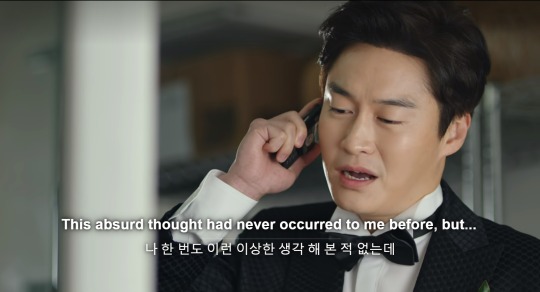
V+(으)ㄴ 적이 (있다/없다)
This form is one of the many grammar rules that are included as mandatory learning material for the TOPIK exam, and is quite useful for being able to discuss a wider variety of things in Korean. It’s used to talk about things that you have experienced and can either mean that you have or haven’t tried something, depending on the usage.
‘적’ is a syllable meaning ‘time’ or ‘occasion’, although when learning this form, it may be easier to think of it as ‘experience’. By adding 있다, you are saying that you have had the occasion, or that you’ve experienced the action that is being discussed. Alternatively, by adding 없다, you are saying that you haven’t experienced it that action.
Here is the basic structure of this form, as well as some example sentences:
V + (으)ㄴ 적이 있다 - I have experienced
V + (으)ㄴ 적이 없다 - I haven’t experienced
Have you ever been to Europe?
유럽에 간 적이 있다?
You’ve never been late to work?!
회사에 지각한 적이 없어요?!
I’ve made some mistakes because I can’t speak Korean.
한국말을 몰라서 실수한 적이 있다.

V + 아/어 본 적이 (있다/없다)
This form can also be combined with the 아/어 보다 form to indicate that you have/haven’t tried something, or to say that such an action is unthinkable.
Have you ever been to Europe?
유럽에 가 본 적이 있다?
I have tried wearing Hanbok.
저는 한복을 입어 본 적이 있어요.
This is the version of the (으)ㄴ 적이 있다/없다 form that is used in this scene. Dong-min explains to Dani and Eun-ho 이런 이상한 생각 해 번 적 없는데. Here, he is saying ‘I have never (해 번 적 없다) experienced such a strange thought,’ or more naturally ‘such an absurd thought has never occurred to me’. The addition of 아/어 보다 here indicates that it was such an absurd thought, that it never crossed his mind before. His usage of 한 번도 beforehand exaggerates this even further, as the meaning of this phrase ‘not even once’.
#korean#learn korean#topik#topik 1#topik grammar#learn korean with kdramas#kdrama#romance is a bonus book#langblr#south korea#common korean grammar#basic korean grammar#korean resources#lee jong suk#lee nayoung#korean language blog#적이 있다#적이 없다
11 notes
·
View notes
Text
Episode 1-2 / Vocab
고객님 customer
전화기 phone
음성 voice
사서함 mailbox
연결되다 to connect
피아노를 치다 to play piano
고생을 하다 to work hard
빨간불 red light
사고를 치다 to cause an accident
그러게 (그러게 말이야) you’re right
둘이 two people/both
음성 voice
사서함 mailbox
연결되다 to be connected
너희 you (plural, informal)
저희 you (plural, formal)
얼른 quickly
오해하다 to misunderstand
분명히 clearly/obviously
돌아오다 to return
데리고 together with
못나다 to be ugly
놈 jerk/asshole
장모님 mother-in-law (mother of the bride)
쓰러지다 to faint (passive)
데려가다 to take back/bring back
#korean#learn korean#korean blog#korean vocabulary#korean vocab#korean vocab list#beginner korean#intermediate korean#advanced korean#romance is a bonus book#learn korean with k-dramas#learn korean with kdramas#kdrama
10 notes
·
View notes
Text

This episode introduces us to a really useful expression - 사람 잘못 봤습니다.
This expression is in the honorific form and literally means person (사람) wrong/mistake (잘못) saw (봤습니다), or ‘you saw the person wrong’. Once we naturalise that, it means ‘you’ve got the wrong person,’ or ‘it’s not me’.
This expression is likely to come up in many crime dramas, where a criminal is arrested and pleads by saying 사람 잘못 봤습니다. Although there are many other similar ways of saying the same thing, this phrase is used very often to refuting claims about yourself. In fact, it was the headline of assemblyman 김경수’s response to claims of rigging votes in 2018.
In this episode, Cha Eun-ho is using this expression too try and pretend that the girls have him mistaken for someone else so he can escape the situation quickly and rush off to find Dani.
Have you heard this expression recently? Let me know in the comments below!
#korean#korean blog#korean language blog#Korean langblr#korean expressions#korean idioms#korean sayings#한국어 배우기#한국어#learn korean with k-dramas#learn korean with kdramas#romance is a bonus book
8 notes
·
View notes
Text
Episode 1-1 / Grammar / (으)ㄴ 지

(으)ㄴ 지
Some of you may already know this form, since it’s really commonly used and is one of the essential grammar forms taught in Korean classes. It’s a really useful form to use and is easy to use even for beginners, so if you don’t already know it I’d really recommend studying it. This form is used to indicate that a certain amount of time has passed since an action took place. It may sound confusing at first, but after we take a look at some examples it should make much more sense.

The typical structure of a sentence which uses the (으)ㄴ 지 form is a verb, followed by (으)ㄴ 지, then a certain amount of time. The sentence then ends with 되디 / 지나다 / 넘다, which are all just different ways to say that the time has passed.
Conjugating this form is really easy too. You take the plain form of a verb and add ㄴ 지 if it ends in vowel, or 은 지 if it ends in a consonant. If the verb ends with ㄹ, this is replaced with ㄴ 지. The tense comes at the end of the sentence here, and since we’re talking about something that has already happened, the past tense is always used with this form.

Now that we know how to use this form, we can start to understand what Dongmin is saying. He states that “야 싸운 지, 그건 일주일이나 지났고 아”. If we simplify this to the basic form of the sentence, it becomes “싸운 지 일주일이나 자났어요,” meaning that it’s been a week or so since he and Dani fought. The added 그건 is used for emphasis. He is repeating the main point of the sentence, similar to how in English you might say “It’s been a week since we fought. A week!” The 아 and 야 are just exclamations thrown in there to show Dongmin’s frustration.
I hope this helps, and don’t forget to review these forms and watch the scenes with no subtitles to help improve your Korean!
#korean#south korea#Korea#learn korean#korean language#korean language blog#language learning#learning languages#learning korean#learn korean with k-dramas#learn korean with kdramas#romance is a bonus book#lee jong suk#lee nayoung#kdrama#korean grammar#common korean grammar#topik 1#topik
5 notes
·
View notes
Text
Episode 1-1 / Culture / Traditional Korean Weddings

As this scene is all about marriage, I thought it would be interesting to dive into Korea’s wedding culture. Every country has their own traditions surrounding marriage and Korea is no different. Although this scene portrays a modern, more Western style wedding, I’d like to start by taking a look at the traditional ceremonies. You can see the slight influences of these traditions in modern ceremonies and some Korean couples have been showing interest in these kinds of weddings again.
Traditional Korean weddings are full of symbolism. Starting with the clothing, the couple wear clothing that was typical of government officials or nobility during the Joseon dynasty. The bride would wear red, representing yang. The groom would wear blue, symbolising yin (although sometimes they might wear the purple robes that were typically associated with lower government officials). The joining of the couple would bring yin and yang together, creating balanced energy. Red dots are also painted on the bride’s cheeks to represent innocence and to ward off evil spirits.
As for the ceremony itself, there are some really interesting customs involved, which you can see in this performance. The wedding takes place in the bride’s courtyard. The groom arrives carrying a ceremonial wooden mandarin duck which represents faithfulness and devotion, as the animal mates for life (although the tradition used to be a live pheasant). This is offered to the bride’s family in a ritual called 전안례 (Jeon-an-rye). The couple then washes their hands to purify themselves, before bowing to each other in a ritual called 교배례 (Kyo-be-rye) meaning ‘bow of faith’ and carrying out 합근례 (Hap-gun-rye), a ritual where the couple each drink from half of a gourd, which is then joined back together to represent their union. Other rituals which are sometimes included are 신랑다루기 or 동상례, where the groom is bound, asked embarrassing questions, and struck across the feet by attendants, and 폐백 (Pyebaek) where the bride catches jujube and chestnuts in her skirt. The amount of jujube and chestnuts she catches represent how many children the couple will have.
Although many Koreans now opt for a more modern wedding, similar to what is observed in the west, some couples choose to include certain traditional customs. Typically, bowing to the families of either couple is still an important part of the ceremony, as filial piety is an important part of Korean culture.
16 notes
·
View notes
Text
Episode 1-1 / Grammar / (이)야 and 거고
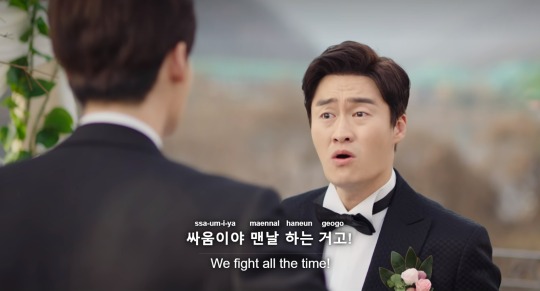
The first two particles that we’ll be going over are fairly simple, so I’m combining them both into one short lesson.
(이)야
To understand this sentence, let’s start with (이)야. This particle is simply used to emphasise nouns or adverbs. As you may have learned, the topic particle 은/는 does the same thing. These two particles are essentially interchangeable and using (이)야 is only important if you want to add a more opinionated nuance or variation to your words. In the sentence “싸움이야 맨날 하는거고,” Dongmin uses this particle to add that opinionated nuance and emphasise his feelings on the matter.

거고
As for 거고, this one is a little bit more complicated on the surface, but actually uses two forms which we’ve already covered. The two forms are the 는 것 principle and the connective 고. If we take the first part of this sentence, we have 싸움이야 맨날 하는 것, meaning that the subject of this sentence is that the couple fights everyday. The 고 principle should usually be followed by some kind of additional information, however in this instance, it’s obviously something that the two men have discussed quite often, so this particle is used to show that the rest of the sentence has been omitted because we can assume what’s happening from the context. The full sentence would be something like “싸움이야 맨날 하는 건 이상한 일이 아니잖아.”
#korean#south korea#learn korean#kdrama#learn korean with kdramas#romance is a bonus book#lee jong suk#lee nayoung#korean grammar#intermediate korean grammar#korean colloquialism
12 notes
·
View notes
Text
Episode 1-1 / Vocab

말고 Forget it
군 Mr (unmarried man)
양 Miss (unmarried woman)
신랑 Groom
신부 Bride
입장 Entrance
없어지다 To disappear (literally ‘become gone’)
얘 He/She/They
맨날 Every day
이유 Reason
아무 Any
일주일이나 A week or so
지나다 To pass by
화해 Reconciliation
비명 Scream
작가(님) Writer
계약 Contract
#korean#south korea#learn korean#korean vocabulary#korean vocab#korean vocab list#korean study blog#korean studyblr#korean language blog#Korean langblr#kdrama#learn korean with kdramas#romance is a bonus book#lee jong suk#lee nayeon
11 notes
·
View notes